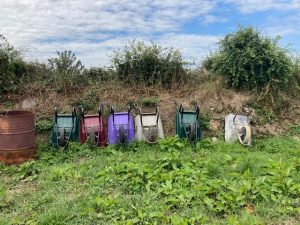The Sustainable Development Fund (SDF) has supported more than 200 projects since 2000. Have a look at these SDF case studies to find out more about how the SDF really works in practice with local organisations committed to bringing sustainability to the Pembrokeshire Coast National Park.
Fishguard Sports AFC
Location: Fishguard
SDF grant awarded: £5,760
Fishguard AFC set out to reduce their carbon footprint by changing the way they maintained their sports pitches. Previously, a diesel-fuelled tractor was used to mow the grass to the level needed for playing sports and a petrol strimmer was used for the hedges. There was a high cost involved in maintaining these machines and paying for their fuel. In a bid to reduce their environmental impact, along with reducing its financial outlay, the club planned to replace the fossil fuel cutters with electric versions that could be charged using solar panels. The club already had a solar panel and battery system to charge the new purchases from 100% renewable energy.
The SDF grant facilitated the purchase of a small self-propelled electric mower and an electric strimmer. The club estimate that with this new equipment they will save 200 litres of diesel a year, equivalent to 500 kg of CO2. There is also a significant financial saving: along with the reduction in fuel use, the new equipment does not require the same maintenance as the diesel and petrol machines.
“The overall impact has been to reduce the amount of diesel that we have needed to purchase this summer and thus the amount of carbon we have saved”
The self-propelled mower also has a mulching attachment, which means that the group will reduce their use of commercial fertilisers on the pitches. It is also lighter than the tractor, reducing soil compaction.
EcoDewi
Location: St Davids Peninsula
SDF grant awarded: £19,760
“Community-led decarbonisation: it’s about local people helping with local issues and benefitting our local natural environment.”
EcoDewi is the umbrella organisation directing a multitude of environmental and sustainability projects across the St Davids Peninsular. In 2022, they benefitted from £19,760 from Pembrokeshire Coast National Park Authority’s Sustainable Development Fund. This funding has been used to move forward a number of projects by providing a funded project manager position.
“EcoDewi exists to try to tackle the climate emergency and the biodiversity crisis whilst simultaneously improving community wellbeing in the St Davids Peninsula.”
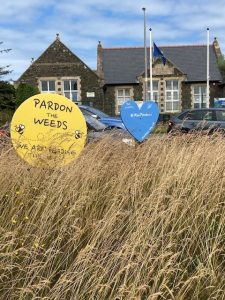
Since receiving the SDF grant in 2022, EcoDewi have taken forward Phase 2 of the project, creating spaces for sustainable land use around St Davids. The aim is to support biodiversity, sequester CO2, and
improve wellbeing in the community. The group have been promoting a reduction in mowing verges, to allow more small spaces for nature to flourish. The “Mini Meadows” project encourages landowners such as schools, businesses, and local residents to allow patches of grasses to grow. This has been supported by the creation of “Mini Meadows” signs that those taking part can put up in their verges, to explain the purpose of the change. EcoDewi have also worked with both St Davids City Council and Pembrokeshire County Council to change the management of verges and amenity grass. By allowing verges and gardens to grow, people are reducing the carbon expended on grass cutting and hedge trimming
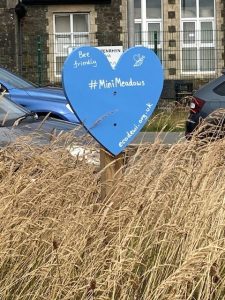
. They are also supporting nature recovery by creating habitat for invertebrates, allowing an increased range of grass species to proliferate, and encouraging native wildflowers to take seed. The Mini Meadows signs have proven so popular that the group have had requests from supporters of mini meadows far beyond the St Davids Peninsula!
Beyond Mini Meadows, the group have worked on hedgerow planting around the city, and aim to work with woodland charities to plant appropriate native trees.
Tree-planting has been central to another of their projects: the community orchard. This project has transformed an area of previously unused land on the outskirts of the city. This is an opportunity to engage local community groups with food sovereignty, organic growing, heritage seeds and healthy eating, demonstrating the co-benefits of environmental action. The heritage apple trees are still young, but in the future, this aspect of the project will bear fruit that the whole community can enjoy!
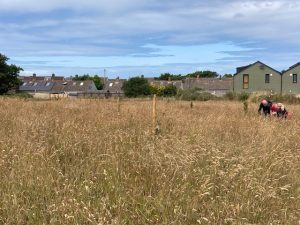
Clydau Solar Bike Shelter
Location: Tegryn
Grant awarded: £11,663
Canolfan Clydau received £11,663 to provide a solar-powered clothes drying room with attached covered secure bicycle shelter, along with charging facilities for electric bicycles.
The group proposed to purchase a used 20′ shipping container, which could be used to provide a drying room for cycle clothing. The shipping container was to be insulated and humidistat extractor fans installed to aid drying. A “Hoop Roof” was to be installed between this shipping container and an existing shipping container to provide a covered area for the secure parking of bikes and also to provide charging points for electric bikes as well as a covered workspace, shelter and gateway to the green space beyond.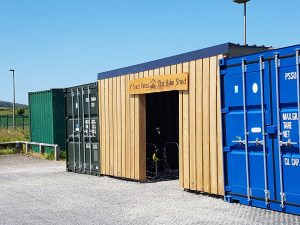
They also wished to install solar photo-voltaic panels on the roof of the container, along with simple battery storage and inverter to allow for the provision of light and power for the container itself – and also for the benefit of any outdoor events or workshops being held at the hall.
The project aimed to encourage and promote active travel within the community: fostering a low carbon, sustainable transportation hub for the wider community. The building tenants, Cwm Arian Renewable Energy (CARE), had 5 members of staff who cycled to work, and as such were great advocates for active travel. The project was undertaken partnership with CARE, who were already trialling an electric bicycle and car club with Dolen Teifi.
With the use of solar photo-voltaic panels and battery storage, the aim was to demonstrate the real-world uses of renewables, and at the same time provide an opportunity for education and promoting awareness with the primary school and the local communities on the benefits of the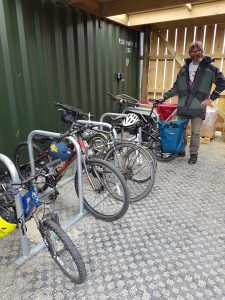 se technologies. The use of Solar PV also reduced reliance on mains electricity and minimised energy costs.
se technologies. The use of Solar PV also reduced reliance on mains electricity and minimised energy costs.
The grant has enabled the centre to have a community bike shed and solar powered drying room. The bike space has capacity for 10 cycles, along with an electric bike charge point. There is also plenty of room to hold workshops in the future or extend the cycle capacity. The shipping container has also been converted into a drying room.
Where possible, the group used local builders, using reclaimed timber or locally sourced timber and materials. Three solar panels were installed on the roof, with an inverter to convert the power into energy and a battery system to allow storage for later. LED lights are fitted in the drying room and corridor and a dehumidifier is available to dry clothes, all of which are powered by sunlight! As well as reducing the centre’s reliance on the grid, the solar technology has also provided an education for staff and pupils, allowing them to continue sharing their knowledge within the community.
Local school children have embraced the space and are regularly cycling to school, cutting down on local car usage. Similarly, staff and community centre visitors regularly use the bike shed, facilitating active transport and offering an alternative to cars. Additionally, there are a number of electric bike cyclists who regularly use the space and the charging point in the bike shed – allowing them to charge their e-bike while attending classes in the centre. There is also an e-bike available for Cwm Arian Staff, and with the ongoing partnership 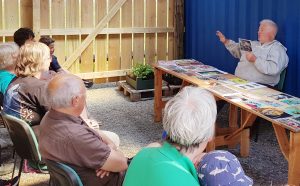 with Dolen Teifi, they are in the process of exploring a wider bike scheme to encompass more local people.
with Dolen Teifi, they are in the process of exploring a wider bike scheme to encompass more local people.
The bike shed has now formed part of the garden project and offers a practical and welcome addition to the garden and hall. It has been used for a talk about bees; a space for tea and coffee; and as shelter from the rain on a workday in the adjacent garden. The group even had the surprise of a nesting swallow in the bike shed, with (so far) two sets of baby swallows!
Peter Kay, Project Manager said of the Sustainable Development Fund:
“We are all very grateful for this grant, it has enabled us to achieve the community’s ambitions as well as provide a low carbon sustainable transportation hub at the centre.”
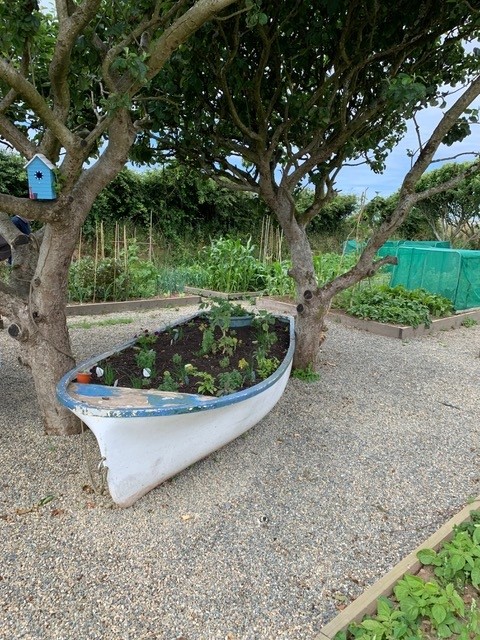
COAST Community Organised Allotments for Solva Tenants
Location: Solva
SDF grant awarded: £8,000
“We set out to create a community allotment space and wellbeing garden in the village for locals to enjoy.”
The Coast Allotment Project set out to transform a small area of wasteland into a useable space for growing vegetables. The land, rented from Pembrokeshire County Council, was covered in rubbish and dead trees when the project first started. In a community effort, the area was cleared and a fence installed on the perimeter. Once cleared, the space was big enough to install 12 micro-plots for local people to grow produce on.
All of the beds are in use by members of the community, with each plot personalised with indications of its grower’s taste and many overflowing with abundant produce.
Excess vegetables grown onsite are donated to the luncheon club for elderly residents. Local care groups and the village council have supported the project, applauding the educational and practical aspects of this local food production. The local primary school use some of the raised beds to grow vegetables, helping the children to learn about biodiversity, self-sufficiency and food security. Most recently, the local nursery school in Solva have asked to have a plot onsite to teach the pre-school age children about growing.
The allotments are having an impact on both carbon emissions and biodiversity – onsite and in the wider community. The site is off-grid, thanks to having solar lights installed on the shed. Rainwater is harvested for growers to use on their plots, reducing use of mains water. All of the plots are held by residents of the village and tools are available onsite for everyone to use, which reduces the need for people to drive to the allotments. The team have installed two large compost areas, which are available for all residents on the street to use, as well as the plot holders.
There are bee and insect hotels onsite, and bird feeders for visitors. The group plan to create a wildlife pond and a garden for animals and birdlife.
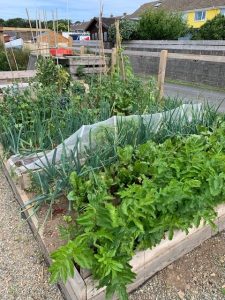 As well as the raised beds, the group installed a community shed. This not only offers shelter on wet days but has created space for a lending library of gardening books. In the future, the group aim to use the space as a “Men’s Shed” for woodworking, and hope to further collaborate with the Pembrokeshire Coast National Park Authority to use it as a base for nature walks and talks.
As well as the raised beds, the group installed a community shed. This not only offers shelter on wet days but has created space for a lending library of gardening books. In the future, the group aim to use the space as a “Men’s Shed” for woodworking, and hope to further collaborate with the Pembrokeshire Coast National Park Authority to use it as a base for nature walks and talks.
Challenges
The Covid-19 pandemic created some delays for the project, including delays in the delivery of the wood to build the raised beds, the installation of the shed, and the new polytunnel. However, all outstanding work should be completed by the end of 2024. A local gardening firm will be employed to finish the last few aspects of the site.
“The project has been met with real enthusiasm… it has certainly raised spirits in the community and once fully completed will be a real asset to the village.”
The group are not stopping there, and have several exciting “next steps” up their sleeves. They aim to create wheelchair accessible planters and install accessible outside seating, create extra raised beds for schools, and plant a number of trees donated by the Woodland Trust.
Richard Davies, Project Manager said of the Sustainable Development Fund:
“I’d just like to thank the National Park for believing in our project and for providing the money to help deliver it.”
